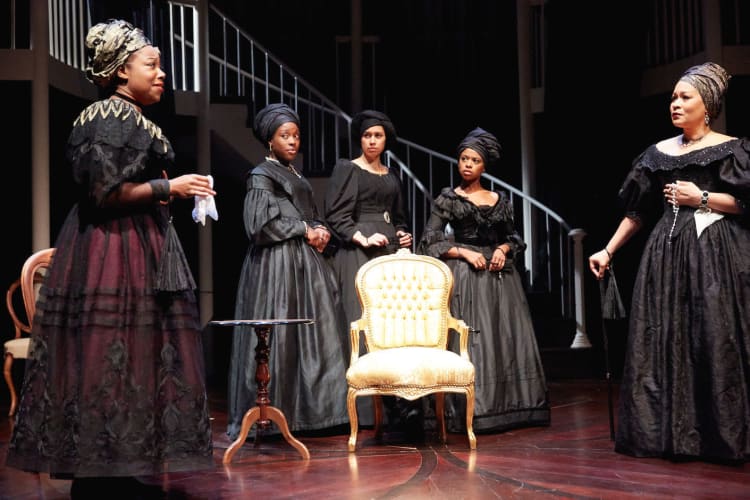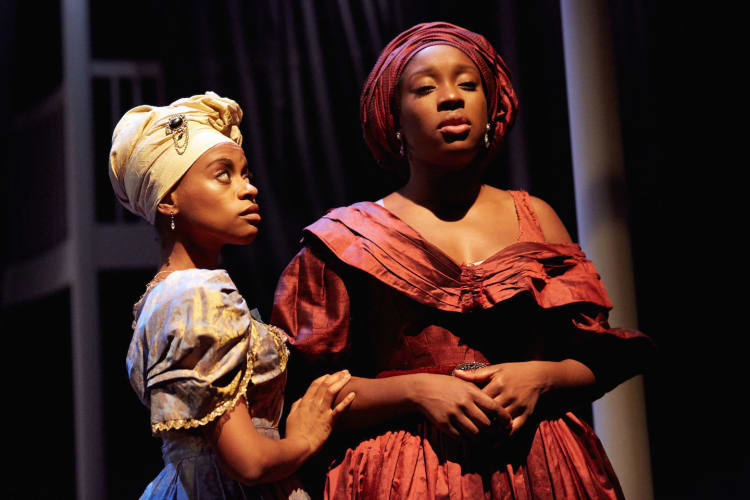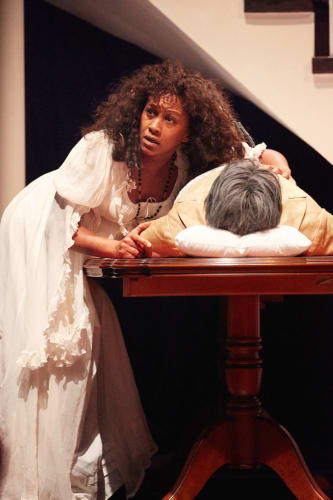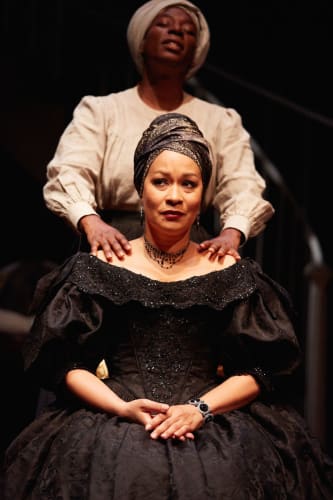This is the story of three mixed race sisters and their mother following the death of their white father. It’s about colour, caste, ancient jealousies and sibling rivalry with a ghost, a woman who’s been locked up as mad and a bold theatricality that director Indu Rubasingham clearly relishes.
It is set in New Orleans in 1836 when, with Louisiana now part of the US, changes were taking place in its society which would alter attitudes to slavery and colour. When it was a French colony and under the Spaniards, Louisiana had a mixed society that included, whites, slaves and free people of colour.
When first colonised by the French, there had been few white women living there and many men took African slaves as mistresses and common law wives, resulting in a population with people of various skin hues among the free as well as the slaves.
Beartrice, the mother of these sisters, has been the mistress of a rich white man but one already married and, though born free, he has seen their best future as placées, or concubines, of rich white men, though their mother thinks otherwise, seeing being sold into plaçage as no better than slavery.
Now, their father Lazare Alban’s body laid out on view, Beartrice thinks her daughters are saved from that future; but what do they want? They may be free women but they are still defined by their colour. As Agnès Albans, the paler-skinned nineteen-year-old eldest, tells youngest sister Odette, she is too dark to be considered beautiful, much darker than the brown paper bag colour that is used as society’s benchmark.
As US law takes over, it will become a world of black and white, free people of colour will lose their rights and slaves have little chance of gaining freedom. Even if there is a will in her favour, a placée’s inheritance will be overridden in favour of a legal wife.
Marcus Gardley shines light on a piece of US and black history not often remembered and offers a reminder that degree of darkness can still alter attitudes but, though serious issues lie below the surface, it is the story’s resolution and its intriguing characters that hold the interest and the drama, which embraces bold theatricality, including a first act curtain of the kind not seen in a new play for age, is also very funny.
There is a touch of Bernada Alba in the controlling maman Beartrice, but Martina Laird gives her a stately stature as she takes dominion over the whole theatre, not just her household. Tanya Moodie gives her slave Mekeda a similar clear-thinking, hardheaded clarity, whether gathering bribes from an enemy of her mistress or spitting sprays of water to control a spectre.
The three sisters are not drawn so dramatically. Ayesha Antoine gives Eldest Agnès a built-up frustration and a caustic honesty. At nineteen, she sees her opportunities slipping. Danusia Smaal as religiously inclined Maude Lynn, is somewhat wimpish and Ronke Adekolyejo’s Odette has a contrasting warmth gaining most sympathy.
Clare Perkins plays Marie Josephine, the lively, mad sister who talks a lot of sense, and Michele Austin finds rich humour in La Veuve, the poisonously jealous nosey neighbour who turns out to be an old rival of maman Beartrice.
The man among this household of woman, first lying lifeless, returns in Paul Shelley’s ghostly Lazare, a little frightening yet also a little funny without breaking the occult atmosphere. This is good, old-fashioned theatre but, with its crisp modern dialogue and its open sexual frankness, it certainly doesn’t seem dated.
Designer Tom Piper presents a patterned timber floor and a curve of white staircase to an upper balcony to suggests a New Orleans maison with Paul Anderson’s lighting creating constant changes of mood and atmosphere while Carolyn Downing’s sound design and Paul Englishby’s music are used very discreetly.
This is a production that embraces the opportunity to create theatrical moments but does not let them interrupt its flow.



